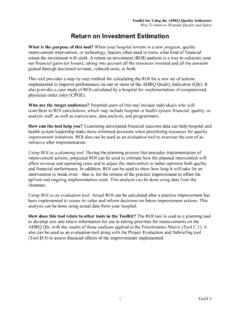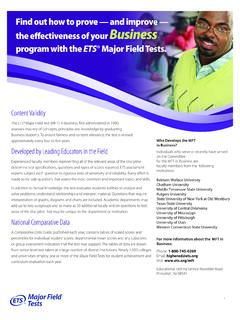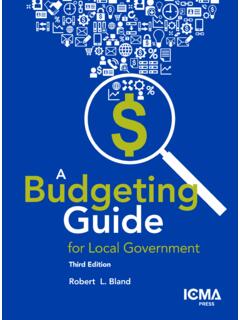Transcription of PURPOSE FOR BUDGETING LITERATURE REVIEW
1 PURPOSE FOR BUDGETING LITERATURE REVIEW Assistant teacher MIRELA-OANA PINTEA1, Associate professor VIOREL-DORIN LACATU 2, Assistant teache LIVIU-DANIEL DECEANUr3 Abstract This paper studies the LITERATURE regarding budgets and their importance within a company. In the current economic climate, companies are starting to pay more attention to efficient management of resources and, for this PURPOSE , use budgets as tools for financial management at company s level and at the level of the main types of company s activities. So, the budget is the most important tool in conducting any activity successfully. A budget is the tool by which a company s management translates into action the corporate strategies and quantitative mission statements. Keywords: budgets, BUDGETING , performance. classification: G31, G39 1. INTRODUCTION The existence, development and environmental adaptation of an economic entity generate a complex network of financial flows that define the general assembly of financial economics at both microeconomic and macroeconomic level, nationally and internationally.
2 Developing a company must be based on knowledge of its capabilities, weaknesses and strengths as well as external macroeconomic environment. From these results it is absolutely necessary to develop an appropriate policy to ensure not only the maintenance of the business to a certain level but also for development in accordance with the changing economic environment in which it exists and operates. For this policy to be as accurate and useful to executive bodies of the economic entity it must set clear financial goals to be achieved and to accurately scale capital needs that can be used cost-effectively. Also, such a policy must be geared towards the future and try to predict optimal financing possibilities depending on existing costs on raw materials, capital and finished goods markets in which the company operates. To ensure a dynamic balance on both short and long term, the company s management is obliged to pay attention to how they are planned and carried out all financial processes within the company: capital needs assessment; finding funding opportunities; organization of raised capital using in the most efficient manner possible.
3 In the context of a competitive market economy, business activity should be conducted profitably according to a balanced relationship between revenues and expenditures. 1 Babe -Bolyai University, Cluj-Napoca, Faculty of Economics and Business Administration 2 Babe -Bolyai University, Cluj-Napoca, Faculty of Economics and Business Administration 3 Babe -Bolyai University, Cluj-Napoca, Faculty of Economics and Business Administration 163To conduct a profitable business the management of any economic entity has to predict expenses, receipts and payments for a certain period of time. This is why budgets have grown to be a primary tool for financial forecasting within economic entities. In the current economic climate, companies are starting to pay more attention to efficient management of resources and use, for this PURPOSE , budgets as tools for financial management at company s level and at the level of the main types of company s activities.
4 So, the budget is the most important tool in conducting any activity successfully. 2. DEFINING BUDGETS Rigorous planning ..of any economic activity is an essential element for the success of those activities. Without planning the activity of any economic entity would detach from surrounding reality ..the capacity for provision and planning of any activities in a market economy conditions assures the survival and development of these activities (Achim, 2009, ). In general the term budget is seen as representing a list (a document) in which are placed face to face predictable revenues and expenditures of a particular economic entity, for a specified period. This approach corresponds to reality, but at a more detailed analysis, this expression reflects a methodological category specific to finance, seen as a scientific discipline. Under this, budget can be interpreted as a general finance specific methodological process through which, it highlights how formation and sizing of financial resources it is done in particular economic entities, on the one hand, and the distribution to various destinations of resources for the fulfillment of predetermined targets, on the other hand.
5 The budget is a planning document which contains a number of financial and / or nonfinancial information that refers to the activities that will take place in the future. BUDGETING is the activity of recording financial and / or non- financial elements into the budget (Achim, 2009a). Blumentritt defines BUDGETING as the process of allocating an organization's financial resources to its units, activities and investments (Blumentritt, 2006), while Horngren et al. sees budget as the quantitative expression of a proposed plan of action by management for a specified period and an aid to coordinating what needs to be done to implement that plan (Horngren et al., 2004). The income budget represents the financial estimation for sales of company s products and services and the expenditure budget is the financial estimation of resource consumption necessary to achieve company s objectives.
6 So, the budget is a financial or quantitative statement, containing the plans and policies to be pursued during a specific time period (typically a year). All decisions made at the company s level (technical, economic, organizational and others) result in affecting the existing financial balance and determine the need for a new balance, employing for this PURPOSE changes in the level and structure of funds and resources needed to finance them. The new financial balance requires reliance on a higher level of financial indicators by BUDGETING . The income and expenditure budget is therefore the company's financial program with which it predicts revenues, expenditures and financial results of its activities, own funds and the loan, businesses relationships, payments to the budget and others. Planning finances of a company is achieved through the process of BUDGETING the business activity.
7 This is an operational plan on a given time horizon, usually one year, which includes forecasting revenues and expenditures of a company, additional capital needs and how to finance them and the main indicators characterizing the hoped efficiency. Even if the budget is a financial plan regarding future revenues and costs of a business, it is about much more than just financial numbers. BUDGETING process involves choosing specific 164objectives of future activities and company policies, programs and procedures designed to ensure the necessary conditions for achieving these objectives. The PURPOSE of the BUDGETING process is to ensure that the financial resources available for a company are used efficiently, for both new attracted resources to finance its activities and excess of capital flows from previous business activities. "At the annual financial BUDGETING stands a strategy for business development in a predictable timeframe for achieving an acceptable probability.
8 Spearheading of this strategy is the marketing studies that may reveal possible future market size and the market slice that the company could count on" (Giurgiu, 2000). 3. BUDGETS PURPOSES Budgets have always played a key role in managing an institution, both private and public, being an important control system in many companies (Ekholm and Wallin, 2000, Merchant and Van der Stede, 2003). Otley sees the budget as the central stage of most organizations systems of management control (Otley,1978). The overall objective of the budget is to keep control of the activity done in the company by providing a roadmap for future activities and to set a series of goals to be achieved and the means by which to achieve those goals (Achim, 2009a). Therefore the management efficiency can be appreciated by the achievement of predefined objectives and the means used to their achievement. There are several empirical studies that demonstrate that budgets are one of the most used planning and control tool for companies (Abdel-Kader and Luther, 2006, Uyar,2009).
9 Managers are responsible for the realization of the indicators within their budgets and for any variance from the estimated values, cases in which they are required to take remedial action. Budgets are used by management for different uses (Riley, 2012): control income and expenditure (the traditional use); establish priorities and set targets in numerical terms; provide direction and co-ordination, so that business objectives can be turned into practical reality; assign responsibilities to budget holders (managers) and allocate resources; communicate targets from management to employees; motivate staff; improve efficiency; monitor performance. According to Romanian authors (Achim, 2009a) BUDGETING purposes (budget functions) are the following: 1. Planning operations that ensure the companies strategic objectives realization. BUDGETING process stimulates managers to predict all the problems before their appearance and thereby avoid making hasty decisions in the event of certain undesirable situations in the future.
10 We can say that BUDGETING "guarantees" that they will plan future operations depending on how it was accomplished the previous budget, taking into account all the factors that have influenced changes regarding previous budget indicators. 2. Coordinating various activities of different types of subdivisions. Coordination of each employee and groups interests. Each subdivision of an economic entity has its own objectives and this can lead to situations in which these goals are contradictory in relation to other responsibility centers. So, the budget has the role to reconcile and regulate these contradictions in favor of the economic entity so that these situations can be prevented. 3. Stimulation of managers from all business levels to achieve predetermined goals of each responsibility center. 165 This budget feature strongly manifests in case of participative BUDGETING when responsibility center managers can propose various quantitative indicators.






